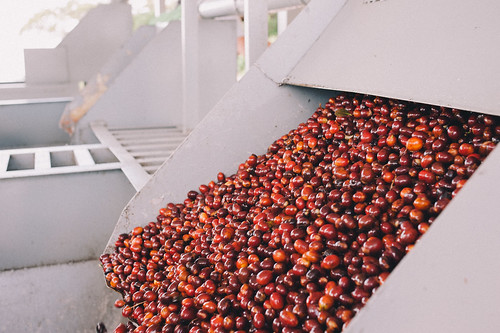Rwanda Gitesi
Nylon Coffee Roasters
Just back from the Southern hemisphere, the overhang of jet-lag has not stopped us from rolling out a new coffee after a 2.5week hiatus. Hailing from East Africa, we are excited to present this new coffee from Gitesi, Rwanda.
There is always an element of “caution” when we cup samples of coffees from East Africa, like Rwanda and Burundi. One of the common problems with coffee from these origins - the potato-taste defect. This defect is not easily detectable visually in the green coffee or in roasted form. Up till now, there is no mechanical way to identify and remove infected beans. Hence, even with top coffees, an occasional cup will have this potato taste. One can smell the odour of freshly-peeled potato in the ground coffee and also from the smell when the coffee is brewed. While we are excited about high-quality Rwandan coffees, the potato-taste defect creates an obstacle for sourcing. Instead of choosing to sideline coffees from this region, we have chosen to buy these coffees, albeit with caution, so as to continue supporting the splendid work by these producers.
The Gitesi washing station is at 1740 meters above sea level with 1,830 coffee farmers in the area that supply their cherries to this station each year. The station fosters a relationship with the farmers by paying an additional dividend at the end of each season based on performance. Gitesi was started in 2005 and has been building capacity each year. It is located in the sub-district of Karongi. This lot was aggregated by looking at all the day lot batches and combining the best ones. Early lots from Gitesi were not cupping consistently good, so were excluded by the guys from Coffee Shrub who have been sourcing from the region for a number of years. They found some tasty batches from the middle harvest to create this lot from Gitesi and we were lucky in getting hold of the last few lbs left in their Oakland warehouse.
When ground, the coffee permeates with gentle floral aromatics. In the cup, we find juicy stonefruits, like peaches and apricots. Lively acidity with hints of mandarin orange and floral overtones. The finish is rather unique - sweet, honeyed herb-like. This coffee is superbly clean and its well-structured body provides the boost to make this a truly enjoyable brew. No potato taste found so far since we started roasting this coffee, this is a big relief. Kudos to the producers and Coffee Shrub for this excellent gem!
- Wet mill: Gitesi, Karongi
- Altitude: 1740m asl
- Producers: 1830 smallholders in the surrounding areas deliver cherries to the washing station.
- Varietals: Bourbon.
- Processing: Wet processed















